Related Research Articles
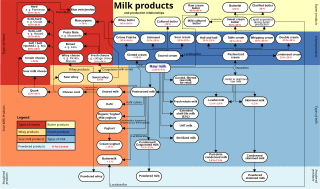
Dairy products or milk products, also known as lacticinia, are food products made from milk. The most common dairy animals are cow, water buffalo, nanny goat, and ewe. Dairy products include common grocery store food around the world such as yogurt, cheese, milk and butter. A facility that produces dairy products is a dairy. Dairy products are consumed worldwide to varying degrees. Some people avoid some or all dairy products because of lactose intolerance, veganism, environmental concerns, other health reasons or beliefs.
Dieting is the practice of eating food in a regulated way to decrease, maintain, or increase body weight, or to prevent and treat diseases such as diabetes and obesity. As weight loss depends on calorie intake, different kinds of calorie-reduced diets, such as those emphasising particular macronutrients, have been shown to be no more effective than one another. As weight regain is common, diet success is best predicted by long-term adherence. Regardless, the outcome of a diet can vary widely depending on the individual.

A fad diet is a diet that is popular, generally only for a short time, similar to fads in fashion, without being a standard scientific dietary recommendation, and often making unreasonable claims for fast weight loss or health improvements; as such it is often considered a type of pseudoscientific diet. Fad diets are usually not supported by clinical research and their health recommendations are not peer-reviewed, thus they often make unsubstantiated statements about health and disease.

Physical fitness is a state of health and well-being and, more specifically, the ability to perform aspects of sports, occupations, and daily activities. Physical fitness is generally achieved through proper nutrition, moderate-vigorous physical exercise, and sufficient rest along with a formal recovery plan.

The Mediterranean diet is a diet inspired by the eating habits and traditional food typical of southern Spain, southern Italy, and Crete, and formulated in the early 1960s. It is distinct from Mediterranean cuisine, which covers the actual cuisines of the Mediterranean countries, and from the Atlantic diet of northwestern Spain and Portugal. While inspired by a specific time and place, the "Mediterranean diet" was later refined based on the results of multiple scientific studies.

A plant-based diet is a diet consisting mostly or entirely of plant-based foods. Plant-based diets encompass a wide range of dietary patterns that contain low amounts of animal products and high amounts of fiber-rich plant products such as vegetables, fruits, whole grains, legumes, nuts and seeds. They do not need to be vegan or vegetarian, but are defined in terms of low frequency of animal food consumption.

Weight gain is an increase in body weight. This can involve an increase in muscle mass, fat deposits, excess fluids such as water or other factors. Weight gain can be a symptom of a serious medical condition.

A healthy diet is a diet that maintains or improves overall health. A healthy diet provides the body with essential nutrition: fluid, macronutrients such as protein, micronutrients such as vitamins, and adequate fibre and food energy.

In gastronomy, red meat is commonly red when raw, in contrast to white meat, which is pale in color before cooking. In culinary terms, only flesh from mammals or fowl is classified as red or white. In nutritional science, red meat is defined as any meat that has more of the protein myoglobin than white meat. White meat is defined as non-dark meat from fish or chicken.
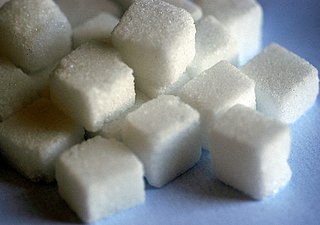
In human nutrition, empty calories are those calories found in foods and beverages composed primarily or solely of calorie-rich macronutrients such as sugars and fats, but little or no micronutrients, fibre, or protein. Foods composed mostly of empty calories have low nutrient density, meaning few other nutrients relative to their energy content. Empty calories are more difficult to fit into a diet that is both balanced and within TDEE, and so readily create an unhealthy diet.

The National Heart Foundation of Australia is a charity established in 1959. Its activities have been funding cardiovascular research, supporting health professionals in their practice, developing health promotion activities, informing and educating the public and assisting people with cardiovascular disease. It describes its mission as "to reduce heart disease and improve the heart health and quality of life of all Australians through our work in Risk Reduction, Support, Care and Research."

Dietary factors are recognized as having a significant effect on the risk of cancers, with different dietary elements both increasing and reducing risk. Diet and obesity may be related to up to 30–35% of cancer deaths, while physical inactivity appears to be related to 7% risk of cancer occurrence.

The Western pattern diet is a modern dietary pattern that is generally characterized by high intakes of pre-packaged foods, refined grains, red meat, processed meat, high-sugar drinks, candy and sweets, fried foods, industrially produced animal products, butter and other high-fat dairy products, eggs, potatoes, corn, and low intakes of fruits, vegetables, whole grains, pasture-raised animal products, fish, nuts, and seeds.
The Dietary Guidelines for Americans (DGA) provide nutritional advice for Americans who are healthy or who are at risk for chronic disease but do not currently have chronic disease. The Guidelines are published every five years by the US Department of Agriculture, together with the US Department of Health and Human Services. Notably, the most recent ninth edition for 2020–25 includes dietary guidelines for children from birth to 23 months. In addition to the Dietary Guidelines per se, there are additional tools for assessing diet and nutrition, including the Healthy Eating Index (HEI), which can be used to assess the quality of a given selection of foods in the context of the Dietary Guidelines. Also provided are additional explanations regarding customization of the Guidelines to individual eating preferences, application of the Guidelines during pregnancy and infancy, the USDA Nutrition Evidence Systematic Review, information about the Nutrition Communicators Network and the MyPlate initiative, information from the National Academies about redesigning the process by which the Dietary Guidelines for Americans are created, and information about dietary guidelines from other nations.
World Cancer Research Fund UK is a cancer prevention charity in the UK and is part of the World Cancer Research Fund network.
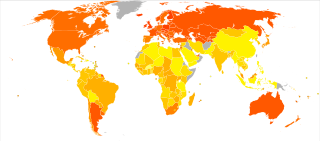
Diet plays an important role in the genesis of obesity. Personal choices, food advertising, social customs and cultural influences, as well as food availability and pricing all play a role in determining what and how much an individual eats.
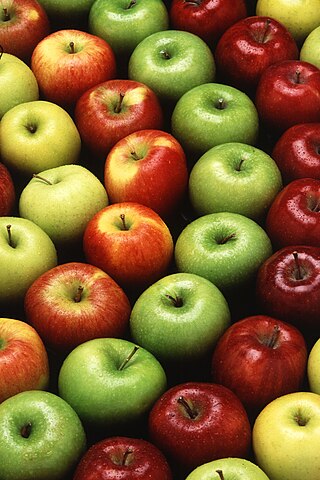
Weight management refers to behaviors, techniques, and physiological processes that contribute to a person's ability to attain and maintain a healthy weight. Most weight management techniques encompass long-term lifestyle strategies that promote healthy eating and daily physical activity. Moreover, weight management involves developing meaningful ways to track weight over time and to identify the ideal body weights for different individuals.
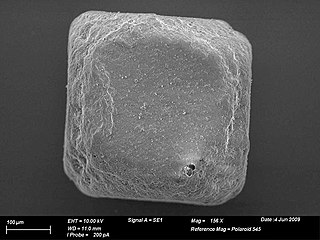
The health effects of salt are the conditions associated with the consumption of either too much or too little salt. Salt is a mineral composed primarily of sodium chloride (NaCl) and is used in food for both preservation and flavor. Sodium ions are needed in small quantities by most living things, as are chloride ions. Salt is involved in regulating the water content of the body. The sodium ion itself is used for electrical signaling in the nervous system.

Sugar-sweetened beverages (SSB) are any beverage with added sugar. They have been described as "liquid candy". Consumption of sugar-sweetened beverages have been linked to weight gain and an increased risk of cardiovascular disease mortality. According to the CDC, consumption of sweetened beverages is also associated with unhealthy behaviors like smoking, not getting enough sleep and exercise, and eating fast food often and not enough fruits regularly.
References
- ↑ The Independent: 'Direct link' between cancer and obesity;
- ↑ Expert Report on Physical Activity
- ↑ "Expert Report on Weight Gain". Archived from the original on 2016-04-20. Retrieved 2013-09-10.
- ↑ Expert Report on Animal Foods
- ↑ "Expert Report on Alcoholic Drinks". Archived from the original on 2016-04-21. Retrieved 2013-09-10.
- ↑ "Expert Report on Preservation, Processing and Preparation". Archived from the original on 2016-04-20. Retrieved 2013-09-10.
- ↑ Diet and Cancer Report website Archived 2010-01-07 at the Wayback Machine ;
- ↑ BBC Online: Be thin to cut cancer, study says;
- ↑ WCRF UK website Archived 2014-07-01 at the Wayback Machine ;
- ↑ WCRF website Archived 2014-07-01 at the Wayback Machine ;
- ↑ New Scientist, Nov 1, 2007
- ↑ The Economist: How to Prevent Cancers;
- ↑ The Times: New rules for defeating cancer;
- ↑ Food Matters
- ↑ The Independent: Cancer and the bacon sarnie;
- ↑ Cancer Research UK reaction to World Cancer Research Fund report Archived 2008-10-01 at the Wayback Machine ;
- ↑ Daily Telegraph: More than one in ten cut down on bacon after World Cancer Research Fund report;
- ↑ Diet and health. What can you believe: or does bacon kill you?;